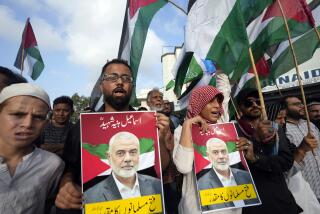In Mideast, Sharon Looks Like a Winner After Speech
- Share via
JERUSALEM — JERUSALEM -- Beleaguered Palestinian leader Yasser Arafat was trying to find something to like in President Bush’s speech Monday, but the clear victor was Israeli Prime Minister Ariel Sharon.
Israeli officials could barely contain their delight at Bush’s game plan for the Middle East and his call for new Palestinian leadership. The consensus among analysts in Jerusalem was that it could practically have been drafted by Sharon himself.
“The president said it well,” Sharon spokesman Raanan Gissin said, noting that the greatest onus was put on the Palestinians and that any Israeli commitment was pushed into the distant future.
Bush’s address came as Israeli tanks and troops continued their march across the West Bank, taking control of most Palestinian cities and belying the vague sketches of Washington’s latest formula for peace.
David Landau, an editor of the Israeli daily Haaretz, pronounced Arafat a “dead man walking,” consigned to history.
“Yasser Arafat, the seemingly immortal leader of the Palestinian national movement, was politically assassinated Monday by President George W. Bush,” Landau wrote early today.
“His role as Israel’s prospective partner in any future diplomatic process was effectively snuffed out by a stern-sounding American president, delivering his verdict on two years of violent intifada and his recipe for a turnabout toward peace in this war-torn region,” Landau continued. “Bush’s verdict: Arafat is the guilty party.”
Palestinians were stunned at the stark terms used by Bush.
“Arafat is the leader of the Palestinian people. He is the elected president of the Palestinian people,” Saeb Erekat, a member of Arafat’s Cabinet and former chief negotiator, told reporters. “Palestinian leaders don’t come from parachutes from Washington or anywhere else.”
Palestinians, who had already judged the Bush administration to be firmly in Israel’s camp, said they resented being asked to pay the price of sacrificing their leader to achieve their state. Many detest Arafat but don’t want the U.S., or Israel, telling them who can run their affairs. He remains a symbol, albeit a tattered one, of the Palestinian struggle for independence.
Arafat himself seemed to ignore the headlines from Bush’s speech and instead praised it as a “serious contribution to pushing the peace process forward.”
“President Arafat and the Palestinian leadership have welcomed the ideas presented by President Bush,” said a statement issued in Arafat’s name and transmitted on the official Palestinian news agency WAFA. It called for urgent talks with the Bush administration and international mediators to reopen peace negotiations.
Arafat, who was again trapped by Israeli armor in his headquarters in the West Bank city of Ramallah, did not appear in public to speak after Bush’s address.
Nor did Sharon. His office issued a statement echoing Bush’s words and forestalling any peace negotiations indefinitely. Only when there is a “complete cessation of violence, terror and incitement,” and when “genuine reforms” in the Palestinian Authority have put a new leader on top, will it “be possible to discuss how to make progress on the political tracks,” the statement said.
Worried that Bush might put pressure on Israel to accept a Palestinian state, Sharon had sought to persuade the administration to delay the policy address that Bush finally delivered Monday afternoon in the Rose Garden. Sharon’s concerns turned out to be unfounded. Bush said a state should be created only after new Palestinian leadership is in place. Arafat’s demise has been Sharon’s goal for decades.
“The Palestinian Authority has to reform, and until then there can be no movement toward peace,” Gissin said. “It’s reform, reform, then peace.”
Palestinian officials did take heart in Bush’s call for an end to Israeli occupation of the West Bank lands captured in the 1967 Middle East War and a reversal of the large-scale army incursions of the last weeks.
But the question in the region was how relevant Bush’s outline can be, given conditions on the ground, where no one is in the mood for talking, much less agreeing on anything.
A Palestinian suicide-bombing campaign targeting Israelis shows no sign of abating, and the Israeli military has taken over nearly all of the Palestinian West Bank, including the very population centers that would form an eventual state. How can Palestinians think about nation-building, Erekat said, if they control no territory?
More to Read
Sign up for Essential California
The most important California stories and recommendations in your inbox every morning.
You may occasionally receive promotional content from the Los Angeles Times.











